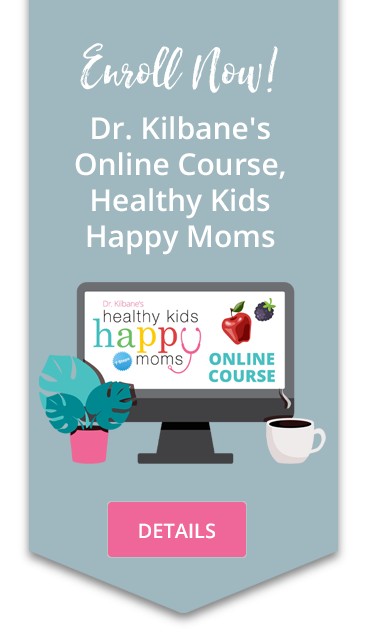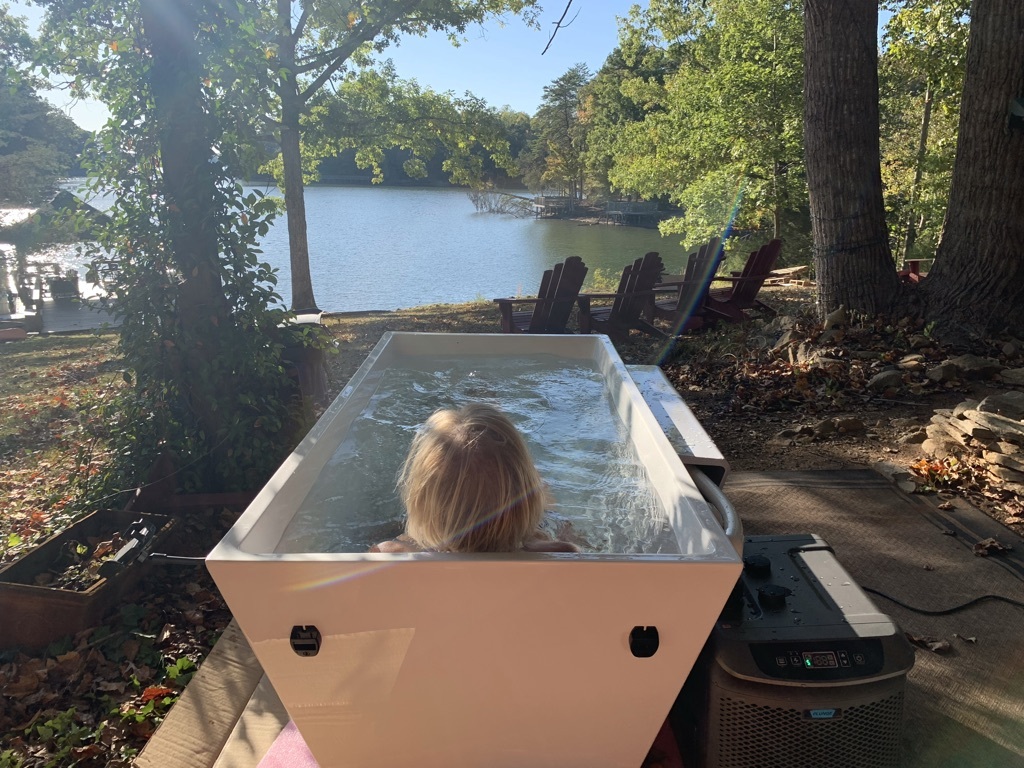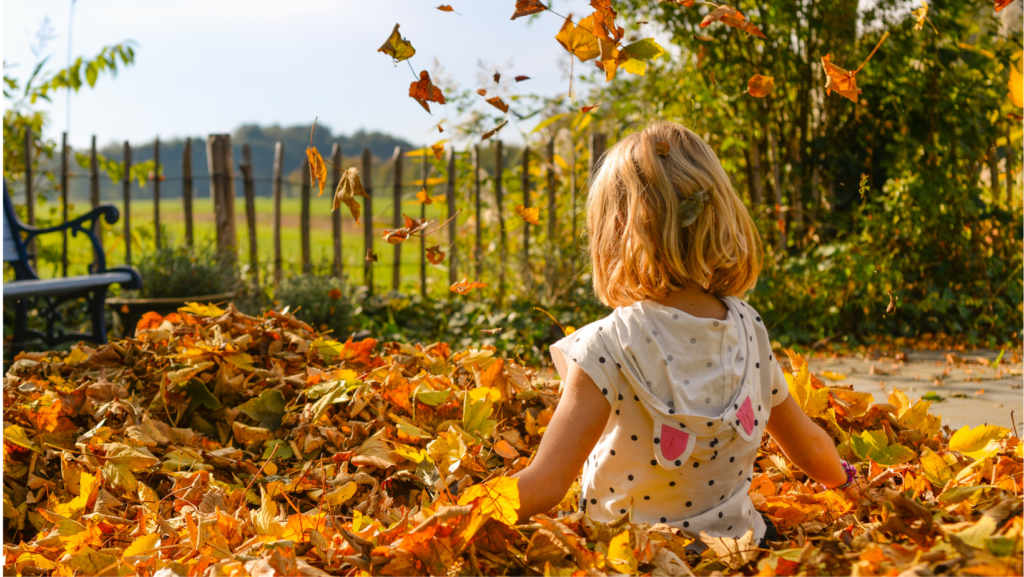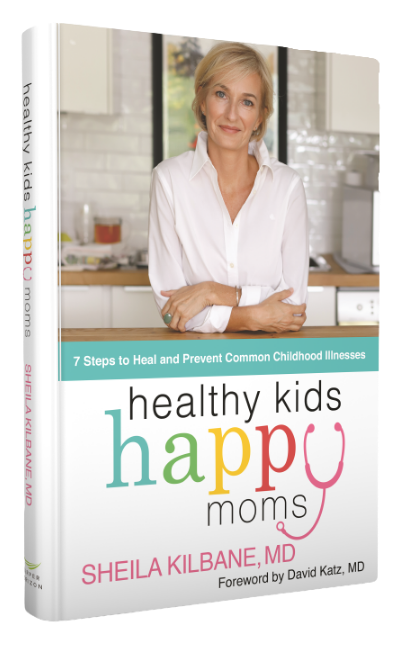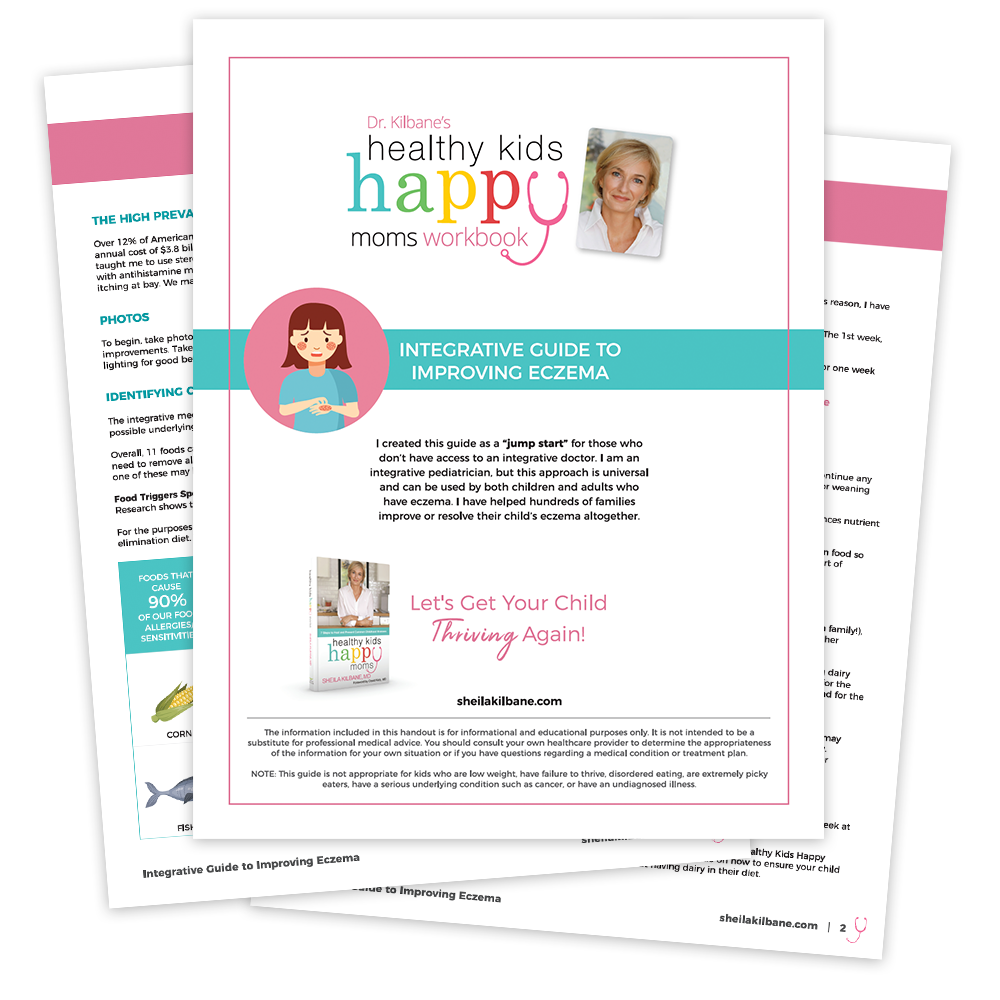RSV, respiratory syncytial virus, is in the daily news. It is not a novel illness, but this year the RSV season began earlier and has struck harder than those in recent memory. RSV symptoms include:
- Runny nose
- Decrease in appetite
- Cough, which may progress to wheezing
- Some may have a low-grade fever
RSV is a common respiratory virus that causes symptoms similar to a cold. This doesn’t discount the gravity of contracting the virus for those most at risk. While the virus is typically mild, it can cause more serious illnesses such as bronchiolitis (inflammation of the small airways of the lungs) and pneumonia (infection of the lungs). In the United States, RSV is the leading cause of both bronchiolitis and pneumonia in children under one year of age.
Why are we seeing so many RSV cases in 2022?
While the virus is typically mild, RSV cases may be higher or more severe this season as we are no longer masking or social distancing due to the COVID-19 pandemic.
In addition, children born during the pandemic did not have the chance to build immunity to this virus. At the same time that RSV is on the rise, cases of other viral illnesses such as the flu are also increasing. This means children may be getting both viruses at the same time.
Which children are most at risk for RSV?
- Children born prematurely (<35 weeks gestation)
- Infants under 6 months
- Children under 2 years old with congenital heart disease or chronic lung disease
- Those with weakened immune systems
Very young babies may not show typical symptoms, instead, you may notice an increase in fussiness and irritability, not wanting to nurse or take a bottle, decreased activity, and apnea (pauses between breaths).
Each year in the United States, an estimated 58,000-80,000 children younger than 5 years old are hospitalized due to RSV infection.
The typical (uncomplicated) course of RSV in healthy babies and toddlers
- RSV usually lasts for 3 to 7 days once symptoms start
- Symptoms often peak around day 3 and then begin to lessen.
- For the young, the old, or those with an underlying issue, the course of illness may vary greatly.
Three things to know about RSV in 2022
- Look for these symptoms
- Runny nose
- Decrease in appetite
- Cough, which may progress to wheezing
- Some may have a low-grade fever
2. See your healthcare provider or go to an Urgent Care facility if you notice any of the following:
- Cough
- Wheezing can lead to trouble breathing. Signs of breathing difficulty:
- Fast breathing
- Head bobbing
- Flared nostrils
- Retractions
- Belly breathing
- Apnea (pauses between breaths)
- Dehydration. Signs of dehydration:
- Dry tongue and lips
- Decreased urination (urine also gets darker in color when it is more concentrated)
- Increased heart rate
- Refusing to drink or eat
- A marked decrease in activity
3. Prevent the virus’ spread. Similar to the coronavirus, RSV is spread through droplets. When an infected person coughs or sneezes, it can enter the eyes, nose, or mouth of someone in close contact.
- Those infected are contagious for 2 to 8 days
- Survives on hands for about 30 minutes
- Survives on hard surfaces for several hours
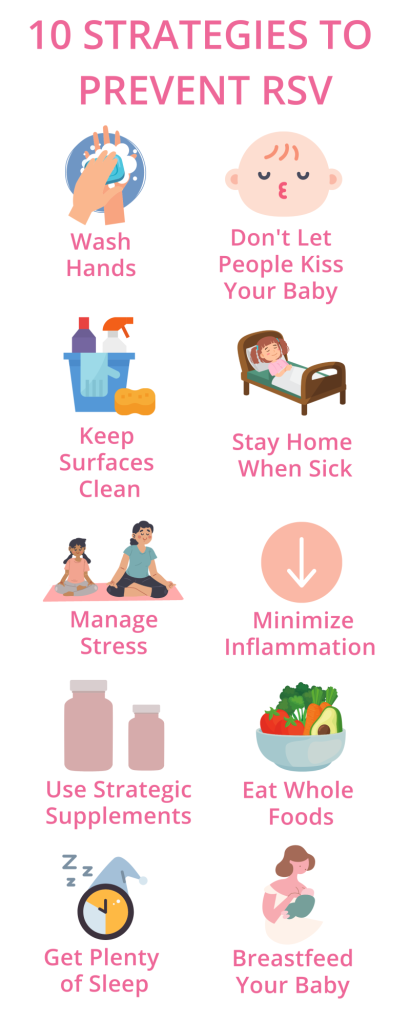
Simple RSV prevention strategies:
- Wash your hands often with soap and water for at least 20 seconds!
- Don’t let people kiss your baby! Avoid close contact with those who have cold symptoms
- Clean and disinfect surfaces and objects such as toys frequently
- Stay at home when you / your child is ill
- Sleep
- Get plenty of rest
- Manage stress using alternate nasal breathing
- SYNAGIS (Palivizumab)
- Synagis is an injectable medication that can be given to high-risk babies once a month during RSV season. Talk to your doctor if you think your baby might qualify.
- Breastfeeding has been shown to have a protective effect for infants with RSV bronchiolitis (lower hospitalization rates of infants diagnosed with RSV bronchiolitis).
- Whole Foods. Focus on feeding your child a whole-food diet, limit processed/packaged foods, avoid added sugar, and make water the only beverage option (kids should drink half their body weight in ounces per day!) Here’s my free seven-day mini-cleanse that will help you get started.
- Minimize systemic inflammation. When systemic inflammation is minimal, our cells function optimally, including the cells of our immune system. Minimal systemic inflammation supporting good health applies to kids and adults. This blog contains the basics about how to do this as it pertains to RSV, but if you’d like a deeper dive, I outline in my book, Healthy Kids Happy Moms – 7 Steps to Health and Prevent Common Childhood Illnesses, exactly how to do this.
Supplements to help prevent RSV
- Vitamin D
- Maintain adequate levels of vitamin D for everyone in your household, including pregnant women
- Vitamin D supplementation during pregnancy may be useful in preventing RSV during infancy.
- Vitamin D deficiency has been associated with an increased risk of RSV in the first year of life.
- Routine vitamin D supplementation to infants was associated with a reduced risk of respiratory tract infection, lower respiratory tract infection, and hospitalization for respiratory tract infection during the first 6 months of life, with the lowest risk found in infants receiving supplements 5–7 days/week.
- Zinc (liquid or capsules). Zinc has anti-viral properties and is important in defending against all respiratory viruses including the flu and the coronavirus.
- Bovine immunoglobulin (IgG) (Mega IgG). A number of studies suggest that bovine IgG or colostrum (from human breast milk) may prevent or lessen viral respiratory tract infections.
- Probiotics protect against RSV infection in neonatal mice. We need more research, but this study suggests that probiotics may be a promising candidate to prevent and treat RSV infection.
Treating RSV
While there is no “magic bullet” to cure RSV, we can provide symptom relief and support the immune system to fight off this pesky virus!
- To reduce congestion and thin out secretions:
- Use a saline nasal spray for kids up to 3 years old
- Use Xlear for kids 4 years and older. Xlear is a nasal spray that contains saline, xylitol, and grapefruit seed extract that helps prevent viruses from adhering to the wall of the nasal mucosa.
- Use a bulb syringe or NoseFrida the “snotsucker” to suction your child’s nose
- Supplement with PureZyme, an enzyme that helps to thin mucus secretions and lower inflammation
- Keep your child hydrated
- Offer water frequently, and do not worry about food if they don’t want to eat
- To increase water intake, you may add an electrolyte replenisher such as Ultima (for kids 1 year and older)
- Use targeted supplements discussed above to support your child’s immune system throughout this season
- Strategic supplements for acute viral illnesses
- For specific dosing of supplements based on age, see our Infinite Health Integrative Supplement Guide
.
Thank you, Chloe Pinner, CPNP, for your help in researching and writing this post. Chloe is the pediatric nurse practitioner at Dr. Kilbane’s private practice in Charlotte, North Carolina.
References:
https://www.cdc.gov/rsv/index.html
https://www.charlotteobserver.com/news/local/know-your-704/article267879582.html
https://pubmed.ncbi.nlm.nih.gov/21555499/
https://onlinelibrary.wiley.com/doi/10.1111/mcn.12987
https://link.springer.com/article/10.1007/s12011-021-02859-z
https://www.ncbi.nlm.nih.gov/pmc/articles/PMC6024018/
https://www.nature.com/articles/s41401-020-00573-5
